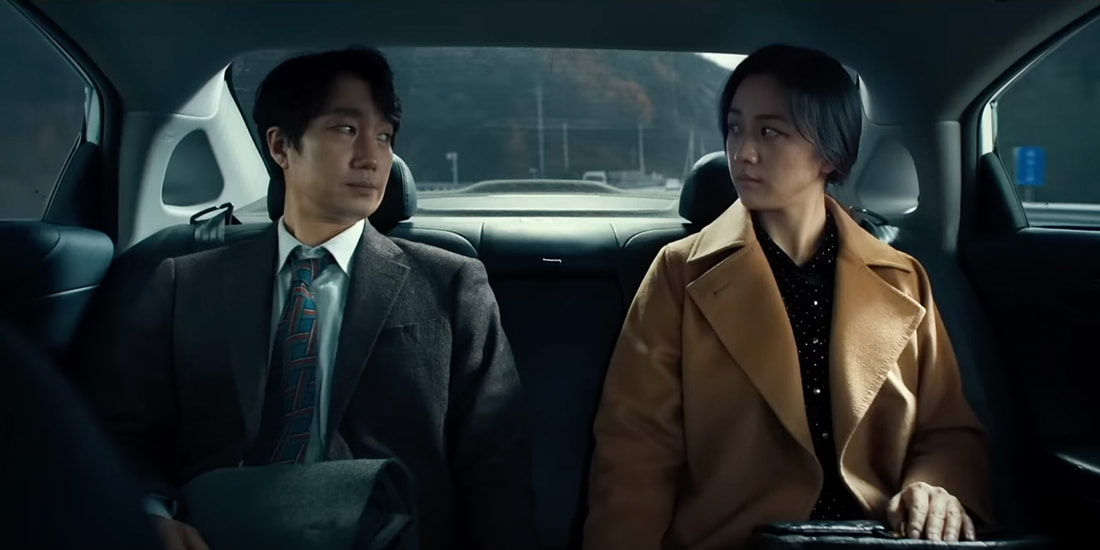
Decision to Leave is a film for those who love ill-fated lovers. Where sensuality and intense chemistry are evoked to perfection onscreen as knowing glances shared between lovers. The film follows the youngest detective on the Busan police force, Hae-joon (Park Hae-il), as he’s spun in a web of deception and suffocating desire. Park Chan-wook crafts a mix of suspenseful police procedural and sweeping romance in this dark mystery of a man grappling with head versus heart. The connection formed between him and a dead man’s wife is followed throughout and tied between them with an unbreakable string. Like a crashing wave, Decision to Leave knocks you off balance and submerges you under the disorientating nature of the affairs of the heart.
Splitting his time between Busan and the misty town of Ipo where his wife lives, Hae-joon is both a revered detective and a doting husband – despite what his wife calls a “weekend marriage”. When a businessman plummets from a mountain to his death, Hae-joon becomes consumed by the case, especially when he meets the dead man’s Chinese wife, Seo-rae (Tang Wei). Was her husband’s death an accident, or was it murder? Hae-joon’s partner Soo-wan (Go Kyung-pyo) is quick to suspect Seo-rae and the audience does, too. She’s not shocked by her husband’s death, and her unexpected expressions catch the detectives off guard. You can never tell the true meaning behind what she says or does.
Everything begins to remind Hae-joon of this case – it haunts him. And the prime suspect will haunt him, too. He’s transfixed by this mysterious woman, the camera focusing on her lips to signal his attraction. As the two detectives tail her, trying to find any evidence of her involvement in her husband’s death, he never wants to lower his binoculars. When he’s invited to her home, he pushes hard on the gas pedal – his desire reaching full throttle. He can’t look away, and you see his feelings for her form thanks to Park’s expressive eyes. Likewise, Seo-rae’s curiosity and love for him also become evident. Their affinity for each other is unexpected, and their relationship is one of both suspicion and attraction. As Hae-joon dives deeper into the investigation and more about Seo-rae is revealed, the further his lust risks clouding him.

These two characters that Park Chan-wook and Jeong Seo-kyeong have created make an impactful impression. Hae-joon is a different kind of detective. He’s quiet, gentle, and kind. Park Hae-il makes the character feel both young and old; naive and wise. He scans everything with wide-eyed wonder and his full attention, especially Seo-rae. She’s a dichotomy. She can be calm, and composed, but also violent. She’s like a chameleon. A multifaceted femme fatale, she knows how to charm, enchant and entice. She’s morally ambiguous and that makes her “a scary woman” in Soo-wan’s eyes. Her story has a darkness to it which adds to both the mystery and fascination surrounding her and the case. The pair seem so different from each other, and yet, they do find similarities. With Seo-rae, Hae-joon also finds a kind of peace. He likes doing late-night stakeouts because he suffers from insomnia, but once he meets Seo-rae, he finally sleeps through the night.
There’s so much to praise about Decision to Leave. The moments of humor surprise and stand out, like Hae-joon climbing a mountain with Soo-wan on his back in order to trace Seo-rae’s husband’s steps. Noteworthy also is Jo Yeong-wook’s score which perfectly captures the shifting tones from beginning to end. At the beginning of the film, the score has a western feel to it as Hae-joon anticipates the metaphorical drawing of pistols between him and whoever the suspect may be. Then, the more shrill violin strings hit to signal the film’s turn to thriller. Finally, the sound of light piano keys for a romance of immeasurable emotion. There are also excellent bits of editing by Kim Sang-bum. Hae-joon will be watching Seo-rae from afar, but when he removes his binoculars he’s suddenly in the room with her. He’s not really, but his wish to be comes true for the audience. And instead of traditional flashbacks, the past and present act simultaneously together, Hae-joon following the scene as though he was there. It’s a unique way of filming an investigation that makes the audience feel more immersed in it. The film’s execution isn’t unblemished, however. There are moments of confusion, especially when time passes and there’s no indication of it, and because of the fact that the detectives are also looking into two cases at the same time. Of course, the one that involves Seo-rae takes more importance, but the other really isn’t necessary to the story at all.
Decision to Leave feels like Park Chan-wook’s own Brief Encounter. Just like David Lean’s 1945 masterpiece, the characters meet unexpectedly and soon find something innocent develop into something deeper, and it’s frightening. Park has his own squeeze on the shoulder, as love is said and expressed in different ways that are more powerful than just those three words crossing their lips. It’s heartbreaking but in the best way.



